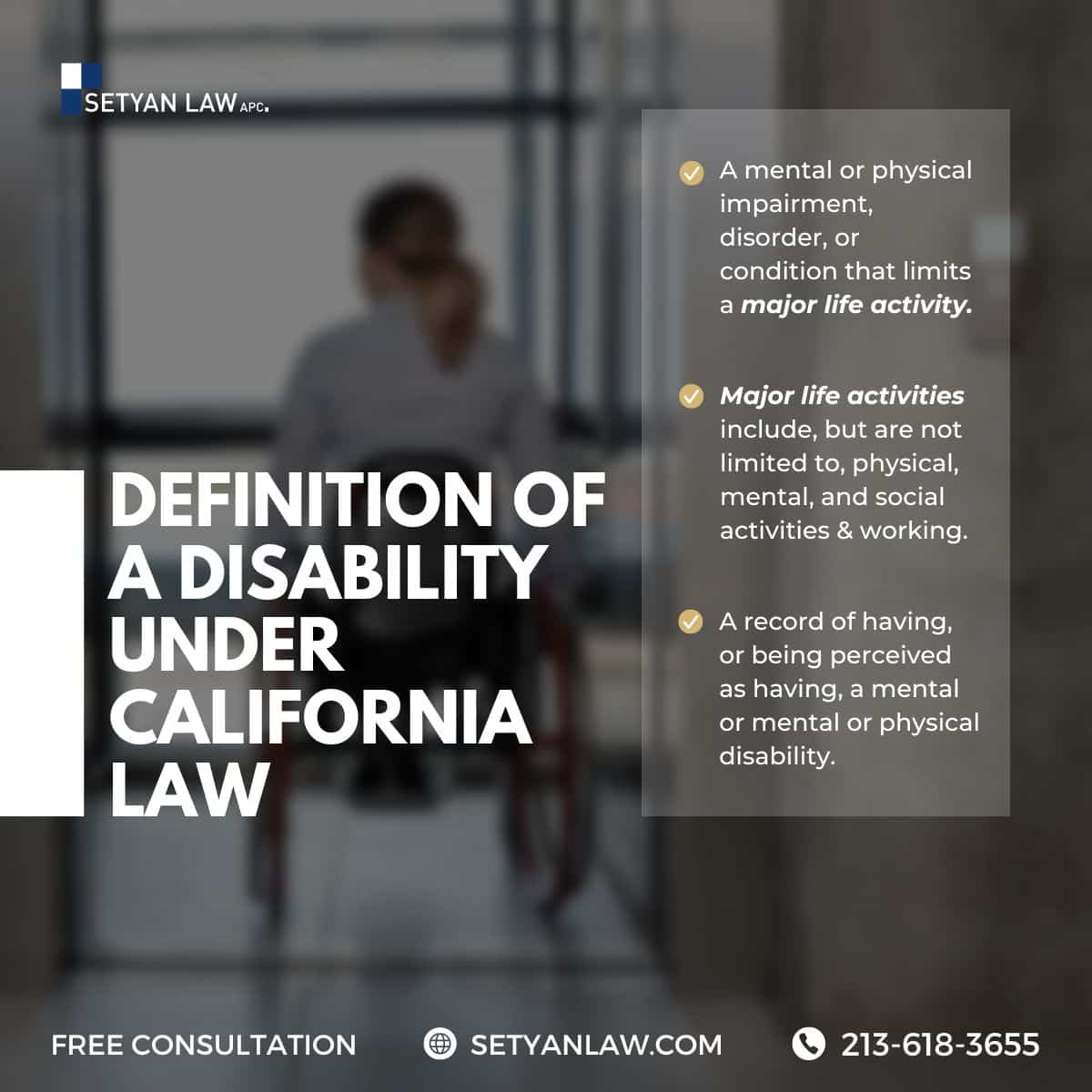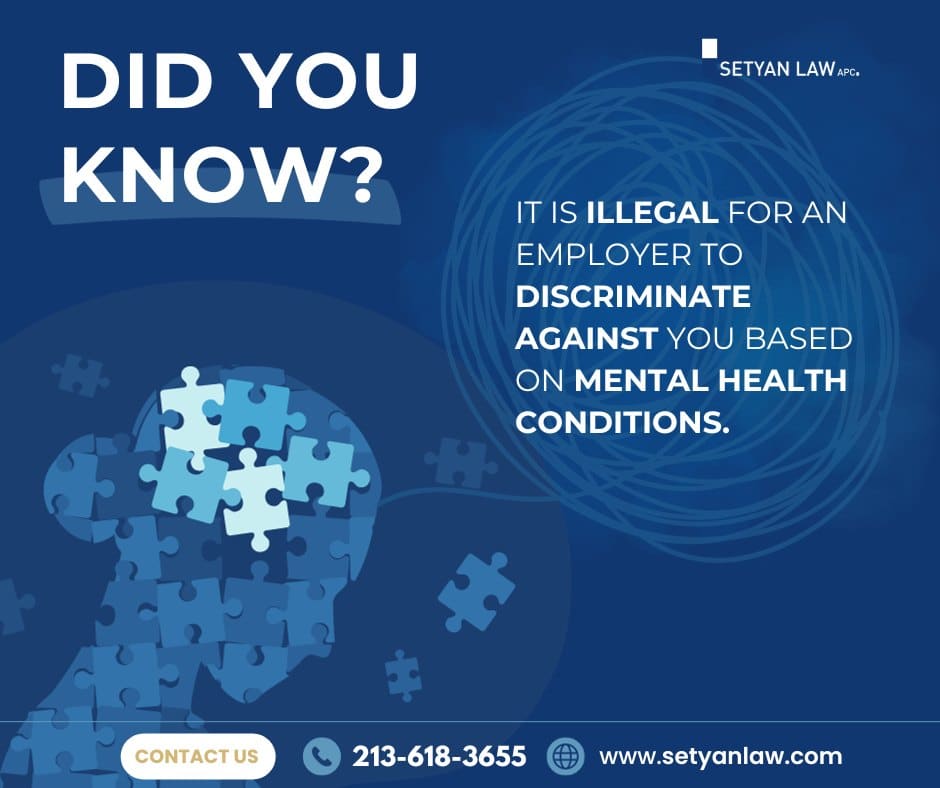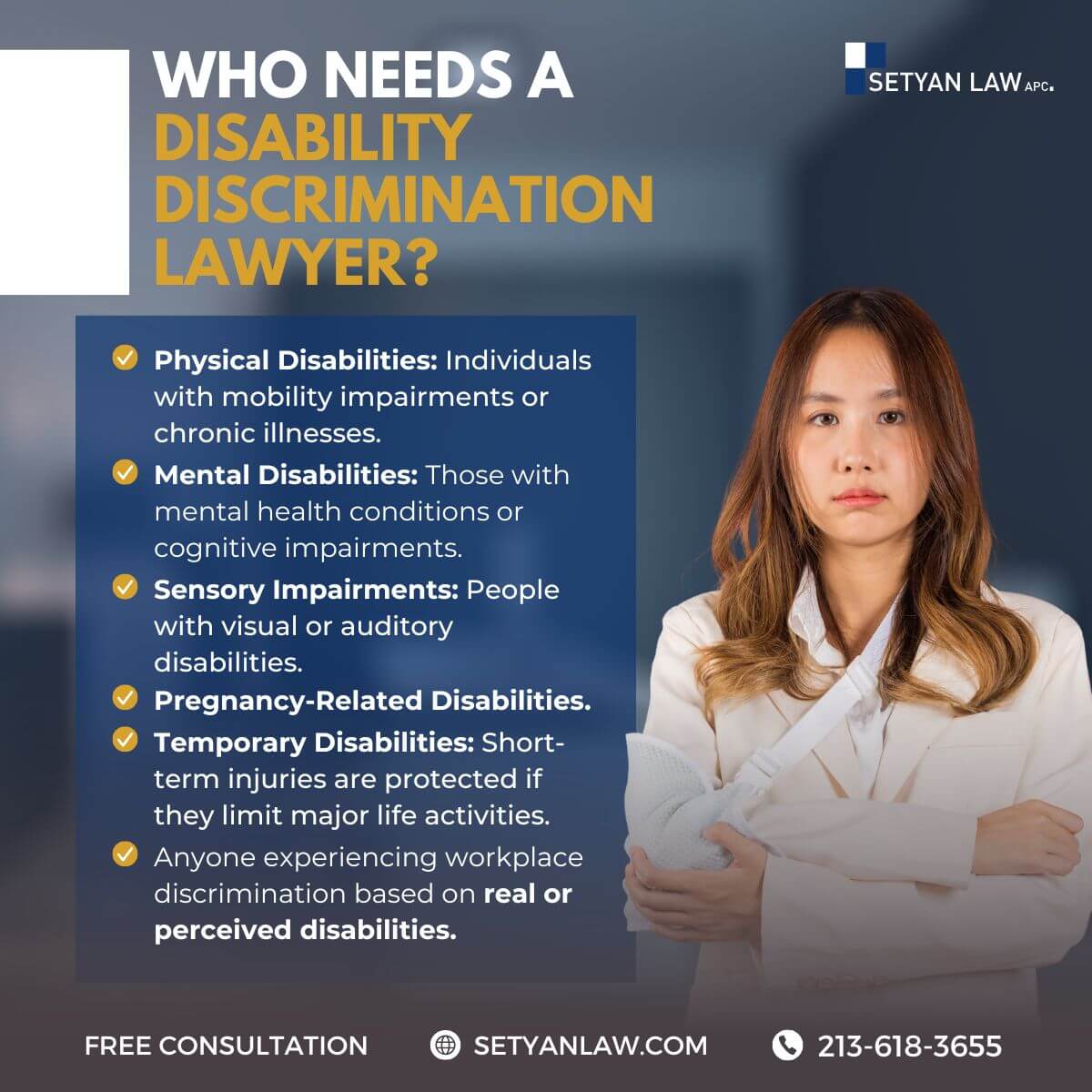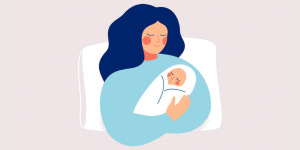Updated November 16, 2025
Mental Health Leave
Navigating mental health leave in California can feel overwhelming when you're already dealing with stress, anxiety, depression, or other mental health challenges. Understanding your workplace rights is crucial—not just for your well-being, but also for your job security and financial stability.
Mental health conditions are legitimate medical issues deserving of accommodation and time off work. California law provides several protections for employees facing mental health challenges, though many workers remain unaware of their full rights under these regulations. Whether you're experiencing temporary mental health difficulties or managing a long-term condition, you have legal entitlements your employer must respect.
This comprehensive guide explains everything you need to know about taking time off for mental health reasons in California. We'll cover the legal frameworks protecting you, different types of leave available, how to properly request time off, and the protections you're entitled to while away from work. Additionally, we'll examine recent legislative updates that have expanded mental health leave rights for California workers.
Understanding Your Right to Mental Health Leave in California
California recognizes that mental health conditions require the same level of care and accommodation as physical ailments. In fact, the state has established robust legal frameworks to ensure employees can take necessary time off for mental health reasons without risking their jobs or facing discrimination.
What qualifies as a mental health condition
Mental health conditions that qualify for leave in California typically include those that make it difficult to perform job functions or manage daily activities. These conditions must generally be diagnosed by licensed medical or mental health professionals.
Qualifying conditions often include:
- Major depressive disorder and mood disorders
- Generalized anxiety disorders
- Post-traumatic stress disorder (PTSD)
- Bipolar disorder
- Panic attacks and disorders
- Obsessive-compulsive disorder (OCD)
- Certain personality disorders
Under the Family and Medical Leave Act (FMLA), a mental health condition is considered "serious" if it requires either inpatient care (such as overnight stays in treatment facilities) or continuing treatment by a healthcare provider [1]. Continuing treatment may involve multiple appointments with mental health professionals or a single appointment with follow-up care like prescription medication or therapy.
It's important to note that certain behavioral conditions are specifically excluded from protection under California law, including pyromania, kleptomania, compulsive gambling, and sexual behavior disorders [2].
How mental health is treated under California law
California law mandates that employers treat mental health conditions with the same seriousness as physical disabilities [3]. This recognition is fundamental to workplace rights throughout the state.
The California Family Rights Act (CFRA) considers a mental health condition "serious" if it requires:
- Inpatient care, or
- Continuous treatment from a healthcare provider
Furthermore, California's Healthy Workplaces, Healthy Families Act allows employees to use accrued paid sick leave for mental health purposes, including:
- Therapy or counseling sessions
- Mental health days for stress or burnout recovery
- Supporting family members with mental health issues [3]
If an employer denies a sick leave request specifically for mental health reasons, this may constitute a violation of California law. The state has taken significant steps to destigmatize mental health issues in the workplace by creating legal frameworks that acknowledge their legitimacy and impact.
The role of FEHA and ADA in mental health leave
Two major laws provide critical protections for employees with mental health conditions: California's Fair Employment and Housing Act (FEHA) and the federal Americans with Disabilities Act (ADA).
FEHA offers significantly broader protections than the ADA and applies to employers with five or more employees (compared to the ADA's threshold of 15 employees) [4]. Under FEHA, a mental disability includes any psychological or mental impairment that restricts a significant life activity [2].
Mental disabilities under FEHA encompass:
- Mental or emotional illness
- Organic brain syndrome
- Specific learning impairments
- Conditions requiring special education or related services [2]
The threshold for protection differs between these laws. Under the ADA, a disability must "substantially limit" a major life activity. In contrast, FEHA only requires that the condition "limits" (not substantially limits) a major life activity, making it easier to qualify for protections in California [2].
Both laws require employers to provide reasonable accommodations for qualified employees with mental health conditions. This might include extended leave for treatment or recovery, modified work schedules, or other adjustments that enable continued employment [2].
Most importantly, these laws make it illegal for employers to discriminate against employees based on their mental health conditions in hiring, firing, promotions, or any other aspects of employment [2].
It’s always best to consult a qualified Medical Condition Discrimination Attorney regarding your case before you file. Employment law has many pitfalls and an attorney can help you navigate past them safely. Sam Setyan will review your grievance, tell you your options, and guide you to the most favorable outcome possible. It’s your call.
Call 213-618-3655 for a free consultation.
Types of Leave Available for Mental Health
California offers various types of leave options for employees facing mental health challenges. Each program has specific eligibility requirements and benefits, providing different levels of job protection and income replacement during your time off.
Paid sick leave under Healthy Workplaces Act
The Healthy Workplaces, Healthy Families Act ensures California workers can take paid time off for mental health needs. As of January 1, 2024, employers must provide at least 40 hours or five days of paid sick leave annually—an increase from the previous 24 hours (3 days) [1].
You qualify for this benefit if you've worked for the same employer for at least 30 days within a year and completed a 90-day employment period before taking leave [1]. The law applies to all California employers, regardless of size [3].
This paid time can be used for:
- Therapy or counseling appointments
- Medication management visits
- Mental health days for stress recovery
- Supporting family members with mental health issues [3]
Employers can provide all hours upfront or set up an accrual system where employees earn at least one hour of paid sick leave for every 30 hours worked [1]. Moreover, California's kin care law requires employers to allow workers to use half of their annual sick leave entitlement to care for family members [3].
Unpaid leave under FMLA and CFRA
For more serious mental health conditions requiring extended time off, two primary laws offer unpaid, job-protected leave: the federal Family and Medical Leave Act (FMLA) and the California Family Rights Act (CFRA).
Both FMLA and CFRA provide up to 12 weeks of unpaid leave within a 12-month period [4][5]. Nevertheless, eligibility requirements differ significantly:
FMLA eligibility:
- Worked for employer for at least one year
- Minimum 1,250 hours worked in the prior year
- Employer has 50+ employees within 75-mile radius [2]
CFRA eligibility:
- Worked for employer for at least one year
- Minimum 1,250 hours worked in the past year
- Employer has 5+ employees [2]
Under both laws, a mental health condition qualifies if it requires inpatient care or continuing treatment by a healthcare provider [4]. For FMLA specifically, continuing treatment includes conditions incapacitating you for more than three consecutive days with ongoing medical treatment, or chronic conditions causing occasional incapacity with treatment at least twice yearly [4].
Short-term disability and mental health
If your mental health condition prevents you from working, California's State Disability Insurance (SDI) program offers financial support. SDI provides up to 52 weeks of benefits when you're unable to perform regular job duties due to non-work-related illness or injury, including mental health conditions [4].
To qualify, your mental health condition must be certified by a doctor or licensed healthcare provider [6]. SDI typically covers 60-70% of your wages during your absence [2]. Consequently, this partial income replacement helps ease financial stress while you focus on recovery.
The application process generally involves:
- Reviewing eligibility through consultation
- Filing your claim
- Obtaining medical certification
- Awaiting determination, typically within 14 days [7]
Emergency leave and crisis situations
During mental health emergencies or crisis situations, immediate leave options may be necessary. Under certain circumstances, you can access job-protected leave for urgent mental health needs, even before completing standard leave request procedures.
If your mental health condition is work-related, workers' compensation might apply. To qualify, your condition must:
- Be a diagnosed mental disorder in the DSM
- Cause disability or need for medical treatment
- Be predominantly caused by workplace events [2]
For immediate mental health crises, prioritize safety first. Afterward, contact your employer about your absence and explore formal leave options upon stabilization. With proper documentation, emergency mental health situations can be retroactively classified under appropriate leave programs, ensuring both job protection and potential benefits.
Always document communications with your employer about emergency mental health situations to protect your rights under California's protective leave laws.
How to Request Mental Health Leave
Requesting time off for mental health concerns requires careful planning to ensure your rights are protected. The process involves several key steps and understanding what documentation is needed to support your request.
Steps to initiate a leave request
Taking the right approach when requesting mental health leave starts with proper medical support:
Consult with a healthcare provider – Speak openly with a doctor, psychologist, or therapist about your symptoms. Be specific about how stress affects your work and health [8]. Your provider may recommend leave as part of your treatment plan.
Review your legal rights – Understand your protections under FMLA, CFRA, and company policies before approaching your employer [9].
Contact your HR department – You may need to complete specific forms or provide documentation of your condition [10].
Submit necessary paperwork – This typically includes medical certification and applications for relevant benefits like State Disability Insurance if applicable [10].
Medical documentation requirements
Employers can legally request verification of your need for leave, although your privacy remains protected:
Your medical certification typically must include:
- The date when your mental health condition began
- Expected duration of the condition
- Relevant medical facts about your symptoms
- Information about ongoing treatment that may interfere with work [2]
Notably, you don't need to share your complete medical history—only information necessary to process your leave [10]. The documentation should confirm you have a serious health condition requiring time off, without necessarily disclosing your specific diagnosis unless you consent [10].
Interactive process with your employer
Once you request accommodation or your employer becomes aware of a possible need, they must initiate an "interactive process" by law [11]. This collaborative discussion helps determine appropriate accommodations:
This process begins when:
- You request reasonable accommodations
- Your employer observes potential need for accommodations
- You exhaust other leave options but still need accommodation [12]
First, you must provide reasonable medical documentation if requested. Subsequently, your employer must analyze your job's essential functions and identify potential accommodations [12]. Throughout this process, both parties must participate in good faith, maintaining open communication.
For mental health conditions making you temporarily unable to perform essential job functions, a job-protected leave is considered a reasonable accommodation [13]. This becomes especially important if you don't qualify for or have exhausted CFRA or FMLA leave.
Remember that smaller employers (five or more employees) are still required to engage in this process under California law, even when federal FMLA doesn't apply [11].
Call Setyan Law at (213)-618-3655 to schedule a free consultation.
Legal Protections While on Leave
Taking mental health leave comes with important legal safeguards that protect your job, prevent negative consequences, and maintain your privacy. Understanding these protections can give you peace of mind while focusing on your recovery.
Job protection under FMLA and CFRA
When you qualify for leave under the Family Medical Leave Act or California Family Rights Act, your position remains secure. Both laws mandate that your employer must:
- Reinstate you to the same or a comparable position when you return from leave [14]
- Continue your group health benefits exactly as if you were still working [14][10]
- Maintain your seniority and benefits accrual if they allow it for other types of leave [14]
These protections apply throughout your entire leave period—up to 12 weeks in a 12-month timeframe. However, they only apply if you've properly qualified and followed required procedures.
Protection from retaliation
California strictly prohibits employers from punishing employees for exercising their right to take mental health leave. Unlawful retaliatory actions include:
- Termination or demotion after requesting/taking leave [3][9]
- Reduction in pay, hours, or responsibilities [15]
- Creating a hostile work environment [15]
- Negative performance reviews without justification [15]
Indeed, federal regulations explicitly state that employers cannot interfere with, restrain, or deny the exercise of FMLA rights [4]. Furthermore, if you experience retaliation, you may have grounds for legal action, including wrongful termination claims [15].
Confidentiality of medical information
Your mental health records remain private under California law. Primarily, your mental health information cannot be released without your explicit permission [5]. Key confidentiality protections include:
- Employers must maintain medical records separately from routine personnel files [4]
- Your mental health diagnosis, prognosis, and treatment plans remain confidential [5]
- You control who can access your information (with limited exceptions) [5]
Accordingly, supervisors may only be informed about your need for time off or work restrictions—not your specific condition [4]. Violation of these privacy protections can result in civil penalties up to $10,000 or three times your actual damages, whichever is greater [5].
Recent Legal Updates and What They Mean for You
California's mental health leave landscape continues to evolve with recent legislative changes providing expanded protections for workers. These updates reflect growing recognition of diverse family structures and the importance of accessible mental health support.
SB 93 and expanded mental health leave
Signed into law in 2024, Senate Bill 93 significantly strengthens workplace protections for employees needing time off due to mental health challenges [3]. Unlike its similarly-numbered predecessor from 2021 (which focused on COVID-19 rehiring rights), this newer legislation specifically addresses mental health accommodations, giving employees greater flexibility when requesting time away for psychological recovery. The law demonstrates California's ongoing commitment to treating mental health with the same seriousness as physical health.
AB 1041 and chosen family care
Since January 1, 2023, AB 1041 has redefined who qualifies as family under California leave laws. This groundbreaking legislation allows employees to take leave to care for a "designated person" – someone related by blood or whose association is equivalent to a family relationship [16]. For mental health support, this means:
- Employees can use CFRA leave to help chosen family members with serious mental health conditions
- Workers can utilize paid sick leave for a designated person's mental health needs
- Employers may limit designations to one person per 12-month period [17]
This acknowledges that only 18.4% of households follow traditional family structures [17], allowing workers to support those who matter most during mental health crises.
Trends in mental health legislation
California continues expanding mental health protections through additional legislation. Recently signed SB 590 will further broaden Paid Family Leave to include designated persons starting July 1, 2028 [18]. Meanwhile, proposed bill AB 1844 aims to explicitly include behavioral health conditions under paid sick leave coverage [19]. These developments reveal a clear trend toward more inclusive, accessible mental health support systems in California workplaces.
Conclusion
Navigating mental health leave rights certainly requires understanding various laws and procedures, but this knowledge empowers you to take care of yourself without jeopardizing your career. Throughout California, workplace protections for mental health continue growing stronger, reflecting a significant shift toward destigmatizing psychological wellness.
The key takeaway remains that your mental health deserves the same attention and accommodation as any physical condition. Whether you need a mental health day under paid sick leave provisions, several weeks through CFRA or FMLA, or longer-term support via disability programs, California law stands behind your right to seek treatment.
Remember that proper documentation strengthens your position when requesting accommodations. Additionally, understanding confidentiality protections helps ensure your private health information remains secure during this process. Most employers must engage in good-faith interactive discussions about reasonable accommodations, including necessary time off.
California continues leading the way nationally with progressive legislation like AB 1041, which recognizes diverse family structures, and SB 93, which expands mental health protections. These changes reflect a growing awareness that mental wellness forms an essential part of overall health.
Your decision to prioritize mental health recovery ultimately benefits everyone—yourself, your family, and even your workplace. Armed with knowledge about your legal rights, you can confidently seek the support you need while preserving both your job security and dignity. Mental health challenges may feel isolating, yet California's robust legal framework ensures you never have to face these struggles alone.
What Counts as a Protected Class?
A protected class is a group of people legally shielded from discrimination under federal or state law. In California, disability and medical conditions are among the most strongly protected classifications.
You are part of a protected class if you:
- Have a physical or mental disability
- Have a serious medical condition or chronic illness
- Are recovering from such a condition
- Are perceived to have a disability
- Have a history of disability
- Are associated with someone who has a disability
Even if your condition is invisible (for example, anxiety, autoimmune disorder, diabetes), the law still protects you.
ADA Discrimination: What the Law Says
The Americans with Disabilities Act (ADA) prohibits discrimination in employment and public accommodations. Under the ADA, individuals with disabilities have the right to:
- Reasonable accommodations at work
- Equal access to public spaces and services
- Freedom from harassment or retaliation
- Fair treatment during hiring, firing, and promotions
Violations may include:
- Refusing to hire someone because of a medical condition
- Denying reasonable accommodations such as modified duties or medical leave
- Harassment based on disability
- Denying access to buildings, services, or programs
If you were denied your ADA rights, a California ADA medical discrimination lawyer can help file a claim or lawsuit.
Call Setyan Law at (213)-618-3655 to schedule a free consultation.









